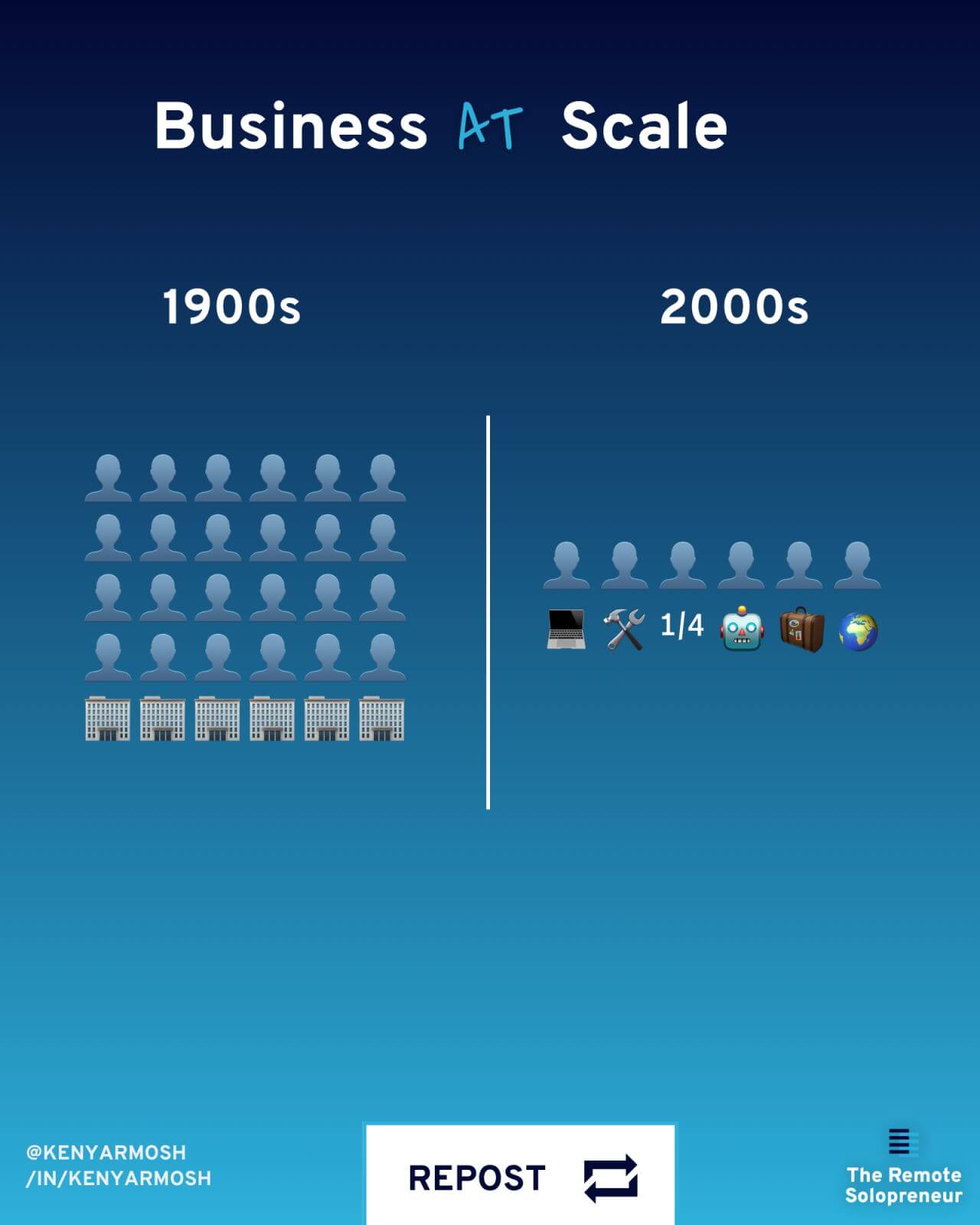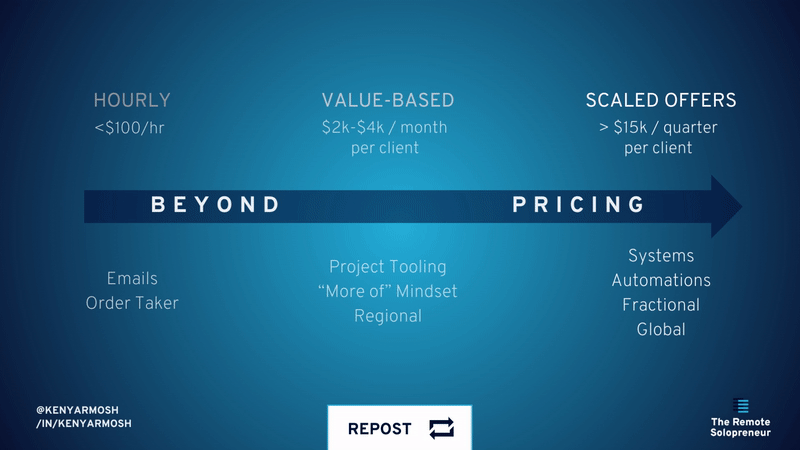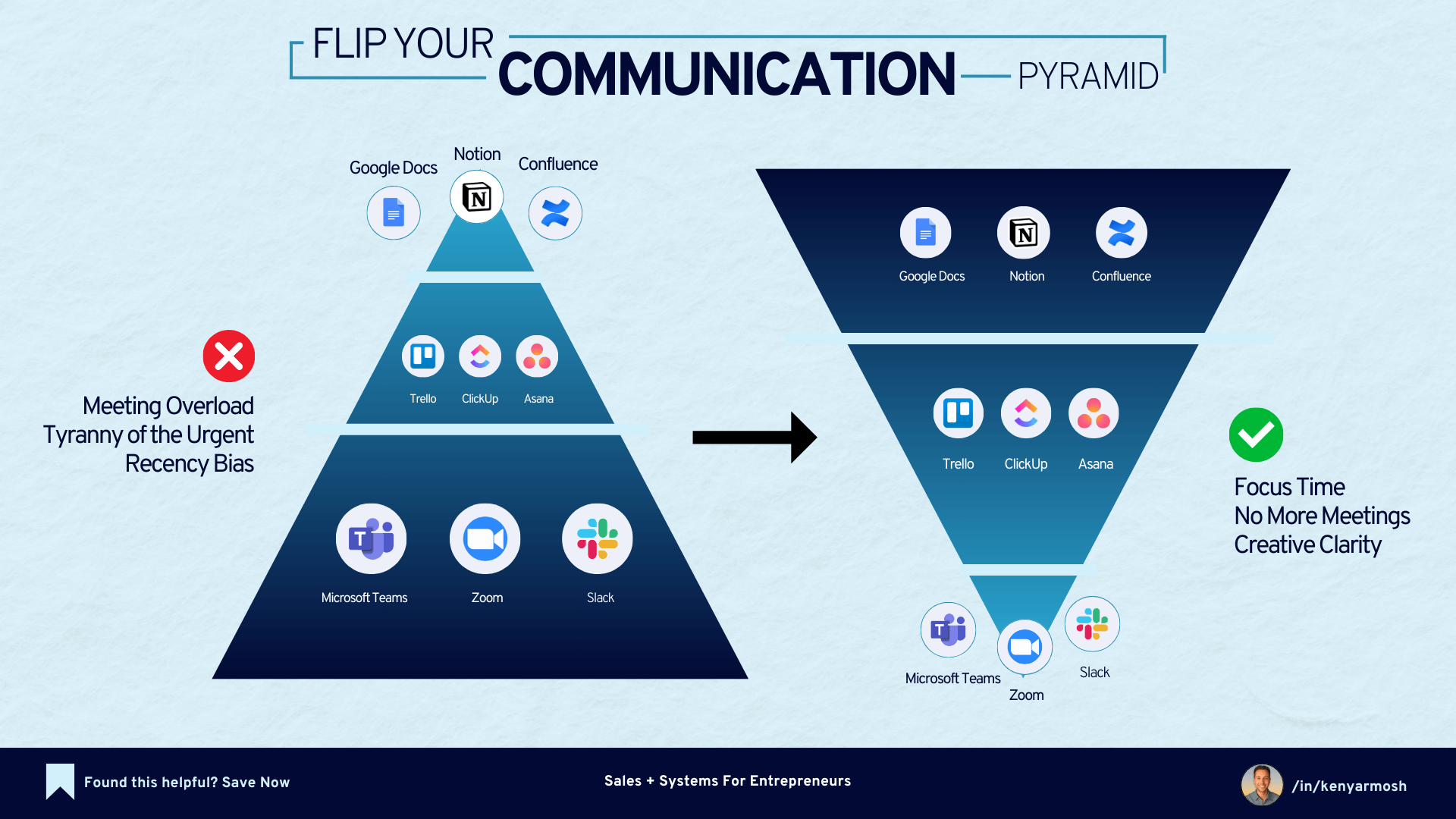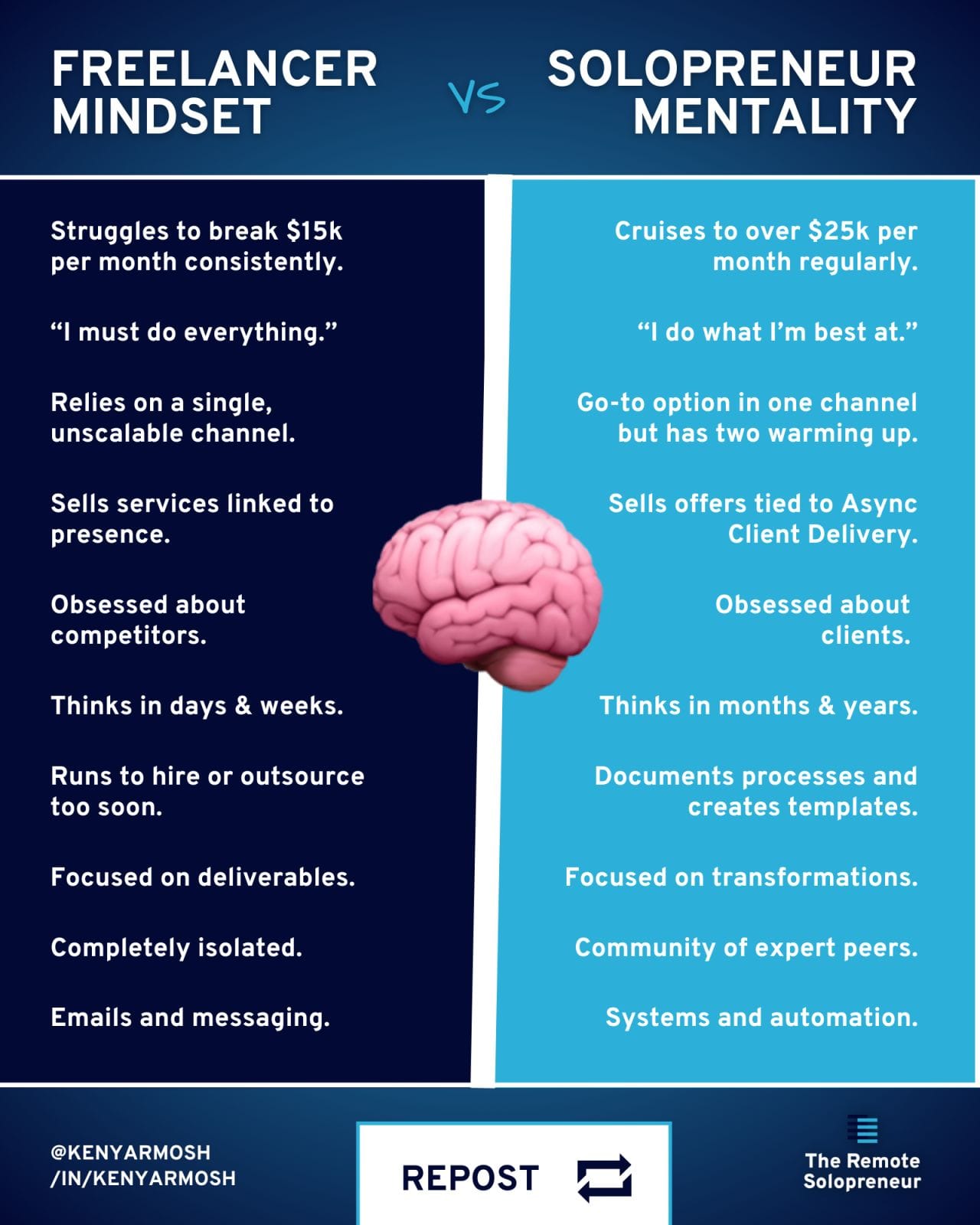Remote work changed how we think about making a living. I’ve been a remote solopreneur since 2005 and have built multiple seven-figure businesses without traditional employees or office spaces.
What seemed impossible two decades ago is now not just possible but is becoming mainstream.

According to the Bureau of Labor Statistics, the United States has 9.82 million self-employed professionals. But the actual number could be higher because every self-employed person doesn’t describe themselves that way. They could define themselves as a small business owner, entrepreneur, or freelancer.
As the world embraces remote work, the demand and interest in solopreneurship are only increasing.
If you’re wondering what a solopreneur is or thinking about taking the leap, you’re in the right place.
In this guide, I’ve covered the step-by-step process and considerations you need to think about before becoming one.
What’s a solopreneur?
A solopreneur is a business owner who works alone. They manage and grow their venture without any employees. That said, this definition goes far beyond working alone.
Modern solopreneurship represents a strategic business model built on leverage and systems. The term combines “solo” and “entrepreneur,” but represents a fundamental shift in how people approach business ownership.
Traditional entrepreneurs build companies to grow teams and secure investors. But solopreneurs take a different path.
They create businesses explicitly designed to function with a team of one. And they do it using technology, partnerships, and strategic business models to scale revenue.

From my work with many successful solopreneurs, I’ve noticed key traits that make them stand out:
- Time independence: They consciously design their business models around having ample free time., They weigh this freedom above money alone.
- Systems-focused: They create repeatable systems for everything from client acquisition to service delivery. It allows them to produce consistent results without constant personal involvement.
- Leverage-oriented: They use technology and automation to boost their impact. Sometimes, they hire contractors for specific tasks instead of adding full-time staff.
- Beyond value-driven pricing: Solopreneurs charge based on the outcomes they create rather than hourly rates or industry averages. This approach allows them to earn significantly more while working less.
- Boundary setters: They set clear boundaries with clients to protect their time and energy. And they’re selective about clients and projects, focusing only on work aligned with their expertise and business model.
When you truly see yourself as a solo business owner, your decisions and strategies change dramatically.
What business models do solopreneurs use?
Some of the most common solopreneur business models include:
- Service providers: They provide specific packages instead of custom work for each client. These packages include clear deliverables, timelines, and boundaries.
- Consultants: They have specific frameworks and systems and develop proprietary methods to create predictable results for clients.
- Creators: They typically use scalable digital products. So, they use their skills to make courses, templates, software, and other digital products. This way, they earn money without spending time on each sale.
- Niche specialists: These specialists offer high-value, low-volume client rosters. They work with a small number of premium clients, charging significantly higher rates for their specialized expertise.
The most successful solopreneurs often combine multiple models. For example, offering high-end consulting services alongside more accessible digital products or group programs.
What are the benefits of being a solopreneur?
Convention employment and traditional entrepreneurship have many disadvantages—despite being the norm.
Let’s look at the different ways in which solopreneurship stands out from other business models:
1. Financial independence
Instead of trading time for money, you can create systems that generate revenue without direct time investment. While freelancers typically charge by the hour or project, solopreneurs price based on the value they deliver.
For example, a marketing consultant who helps clients increase revenue by $100,000 can charge $20,000 for that result. It doesn’t matter if it takes 20 or 200 hours to achieve.
Solopreneurs create different income streams, unlike freelancers who mainly depend on one service income. You can combine your core services with:
- Scalable digital offers
- Monthly retainers
- Affiliate partnerships
- Licensing arrangements
As a solopreneur with a solid business setup, you can gain extra tax benefits that most freelancers can't access. You can establish better retirement plans, create strategic entity structures, and optimize your overall tax situation.
2. Lifestyle design
Freelancers enjoy more flexibility than employees but often remain tethered to client demands and deadlines. Solopreneurs create systems that provide true freedom.
The key difference is in how you structure your availability. Freelancers often change their schedules to fit clients. But solopreneurs create firm boundaries and processes that clients follow. This allows you to design your schedule around your most productive hours rather than what your clients want.
Also, for freelancers juggling multiple clients with competing demands, solopreneurship offers a more sustainable balance. You can use standardized processes and communication protocols to control your time.

3. Purpose-driven work
As a solopreneur, you set your terms and positioning. This helps you attract your ideal clients instead of just taking anyone who shows up. This selectivity allows you to work exclusively with clients you want to work with.
Also, you can create offerings that perfectly align with your strengths and interests. You don’t have to constantly adapt to whatever clients request. This alignment results in more satisfying work and better outcomes.
Freelancers usually struggle to maintain a consistent income while being selective. However, solopreneurs develop marketing systems that continuously attract aligned opportunities.
A healthy pipeline gives you the confidence to say “no” when you don’t want to take on a project.
4. Skill development and personal growth
Running a solopreneur business requires developing competencies across multiple disciplines.
You’ll build sophisticated marketing, sales, operations, finance, and client management skills. This creates a diverse skill set that makes you more adaptable and resilient than specialized freelancers.
Unlike freelancers who primarily improve their craft, solopreneurs focus equally on business development skills. This broader focus creates more career options and income potential in the long term.
For instance, you become qualified for opportunities ranging from consulting to speaking to creating complementary businesses.
Also, this rapid feedback loop helps you develop business acumen faster than freelancers, who typically focus more on project execution than strategic business building.
5. Building valuable assets you truly own
Freelancers primarily sell their time, while solopreneurs build business assets with independent value.
You’ll develop methodologies, frameworks, and content that become valuable intellectual property. Unlike freelancers who often create custom solutions for each client, you’ll build repeatable systems that can be leveraged across multiple clients or packaged into products.
Also, the operational systems you develop have substantial transferable value.
Documented workflows, automation, templates, and procedures create efficiency and consistency, translating to higher margins than most freelancers achieve.
What are the differences between solopreneurs and other business owners?
Understanding the distinct approaches to building and scaling businesses helps you make intentional choices about your path.
Before we look at the differences between different approaches, let’s define the business types we see these days:
- Entrepreneur: A business owner who builds companies designed to grow beyond themselves. They hire employees, develop management structures, and seek external funding to scale. They aim to create a business that can operate without their direct involvement.
- Freelancer: An independent professional who primarily sells their time and skills as a service. They work on client-directed projects and adapt to each client’s processes and specifications as independent contractors.
- Side-hustler: Someone who builds a business while maintaining primary employment elsewhere, dedicating limited available hours to their venture. The demands of their main job can impact their side hustle.
Differences between solopreneurs vs. entrepreneurs vs. freelancers vs. side-hustlers
| Solopreneur | Entrepreneur | Freelancer | Side-Hustler | |
|---|---|---|---|---|
| Team structure | Works solo by design; may hire contractors for specific projects | Builds teams with employees and management structures | Works independently, often within client teams temporarily | Works solo with minimal outsourcing due to time constraints |
| Growth approach | Measures growth through profitability, lifestyle quality, and freedom | Measures growth through revenue increases, market expansion, and team size | Growth is limited by available time; focuses on higher-paying clients | Growth constrained by limited hours outside primary employment |
| Business systems | Develops comprehensive systems for every aspect of business | Creates scalable processes for team implementation | Basic systems for finding and managing clients | Simple structures focused on minimal time investment |
| Risk profile | Lower overhead avoids business debt, scales conservatively | Often takes significant financial risk, including debt or equity investment | Variable income with a direct tie to hours worked | Lower risk due to a stable primary income source |
| Income approach | Creates multiple revenue streams, including passive or leveraged income | Reinvests profits into hiring to support continued expansion | Typically charges by hour or project; income tied to time worked | Treats business income as supplementary to primary earnings |
| Business valuation | Value from systems, IP, and client relationships; designed for ongoing income | Valued based on revenue, growth rate, market share, and team capabilities | Limited sellable value beyond client relationships | Minimal focus on building long-term business assets |
| Client relationships | Establishes own methodologies; clients hire for a specific approach | Builds organizational relationships beyond the founder | Works within client’s frameworks, adapting to their processes | Often limited capacity for client relationship development |
| Financial management | Proper business financial structures with strategic profit management | Formal financial structures, often with investor relationships | Business finances may be sophisticated but simpler than larger ventures | Often mingles business and personal finances |
| End goal | Sustainable business provides freedom and income for the owner | Building something that can be sold or run without a founder | Stable client base providing reliable income | Variable goals from extra income to potential full-time transition |
Which path is right for you?
The “right” approach depends entirely on your personal goals, risk tolerance, and vision for your work life:
Consider the entrepreneurial path if:
- You enjoy building and leading teams
- Your ambitions require significant capital and resources
- You’re comfortable with higher risk for potentially higher reward
- Your goal is to build a company that can eventually run without you
Consider the solopreneur path if:
- You value personal autonomy and direct control
- You want to maximize profit while minimizing complexity
- You prefer lower fixed costs and financial obligations
- Your goal is sustainable income that doesn’t require managing others
Consider freelancing if:
- You primarily want to monetize your skills without building systems
- You prefer variety in projects and clients
- You value maximum flexibility in the work you take on
- You’re focused on near-term income rather than building business assets
Consider a side hustle if:
- You want to explore business ownership with minimal risk
- You’re not ready to leave the security of employment
- You need to build skills or market validation before committing fully
- You’re testing concepts that might eventually become a full-time business
Many successful solopreneurs started as either freelancers or side hustlers. Over time, they develop the right systems and mindset to transition to a true solopreneur model.
Ultimately, your business structure should align with your financial goals, lifestyle preferences, and the type of work that energizes you.
What are the pros of being a solopreneur?
Apart from the larger benefits listed above, here are the day-to-day advantages and disadvantages that make this business model attractive:
1. Complete decision-making authority
As a solopreneur, you have unilateral control over every aspect of your business. You don’t need to compromise or get a committee’s approval.
This autonomy extends to:
- Choosing which services or products to offer
- How to position them in the market
- Which business opportunities to pursue
You can pivot quickly as market conditions change or discover more profitable niches—without needing to convince partners, boards, or investors.
2. Flexibility and autonomy
You can design your work schedule around peak productivity periods and personal commitments. Unlike employees who are constrained by fixed hours, you can structure each day to do the things that matter to you the most.
You can adjust your schedule during family events, health challenges, or personal projects without requesting permission or facing career penalties. And this extends beyond just when you work to how you work.
You can create personalized rituals and workflows that align with your productivity patterns. As a result, you’ll create a healthier relationship with the work itself.
3. Higher profit margins
Solopreneurs typically enjoy significantly higher profit margins than comparable larger businesses. When I owned an agency, I had a monthly payroll of $296,463.65, which just ate into our bottom line. But a solopreneur doesn’t have to deal with multiple salaries, office leases, and other fixed expenses.
For example, a solopreneur generating $200,000 in annual revenue might keep $160,000 as compensation. However, a small agency with the same revenue might only provide $80,000 to its owner after covering employee salaries and overhead costs.
With higher profit margins, you can build your life how you want to—and invest back into the business confidently.
4. Direct connection with clients
Without account managers, sales teams, or other intermediaries, you receive direct feedback about your offerings and develop a nuanced understanding of client needs.
This level of communication gives you valuable competitive intelligence, too. You recognize the following before it becomes obvious to larger competitors:
- Emerging trends
- Shifting preferences
- New opportunities
Many clients also want to work with solopreneurs because they value working directly with the specialist instead of being passed between multiple team members. As a result, you can command premium rates despite their smaller operational footprint.
5. Agility to pivot quickly
You no longer have to deal with complex organizational structures or legacy commitments. You can rapidly adjust to changing market conditions or new opportunities when they arise.

You can also test new ideas, evaluate results, and implement improvements faster. You can change your offers and gain momentum in weeks instead of months.
While traditional companies struggle with the “innovator’s dilemma,” solopreneurs embrace newer business models faster. So, they’re always ahead of the game.
What are the cons of being a solopreneur?
That said, solopreneurship is not always a bed of roses. Here are a few potential drawbacks you can expect with this model:
1. Isolation and decision fatigue
Working solo means giving up that built-in social structure you get with traditional jobs. This isolation hits both your mental well-being and your decision-making.
I’ve spoken with dozens of solopreneurs who built thriving businesses but struggled with spending days alone. In this case, think about how important it is for you to work in a team environment.
Also, beyond just feeling lonely, you’ll face decision fatigue from handling literally everything. A typical Tuesday might require decisions about:
- Client work
- Marketing strategy
- Financial planning
- Tech purchases
- Admin processes
Successful solopreneurs actively counter this by building their own support structures. For example, joining a solopreneur community or hiring business mentors to offer feedback.
2. Income volatility and financial management
Solopreneurship comes with financial uncertainty that creates real stress—especially when you’re starting. If you’re not careful about planning your finances and the next steps for your business, the feast and famine cycle becomes too real.
You’re also handling all those benefits employers typically provide. Health insurance, retirement savings, paid time off, and professional development all come out of your pocket now. These costs can knock 20-30% off what looks like equivalent income on paper.
Plus, tax management gets more complex. Beyond higher self-employment taxes, you’ll manage quarterly payments, track every deductible expense, and probably need professional help to stay compliant.
Follow these practices to stay out of trouble:
- Maintain substantial emergency reserves (aim for 6-12 months of expenses)
- Diversify your income streams so you’re not dependent on any single source
- Implement consistent bookkeeping systems from day one
3. Wearing multiple hats effectively
As a solopreneur, you’re the CEO, sales rep, project manager, accountant, customer service agent, and marketing director—often all before lunch. The business will demand your skills and attention 24/7.
Most people naturally excel in some business functions while struggling with others. Yet as a solopreneur, you must perform adequately across all these domains or risk business failure.
That said, the constant context-switching takes a toll, so I recommend using the “Day Themes” system. You allot specific days for specific clients or types of work to stay focused and deliver higher-quality results.

4. Time management and productivity hurdles
The freedom to set your own schedule becomes a double-edged sword. You don’t have managers to monitor you or colleagues to keep you accountable. If you thrive this way, it’ll be hard to work alone.
The opposite problem—overwork and boundary erosion—affects many solopreneurs, too. Without a clear separation between work and personal life, business activities expand to fill all available time. When everything ultimately depends on you, it’s tempting to work 24/7, leading straight to burnout.
I know several solopreneurs who have all the apps on their phones and find it hard to peel themselves away from them. And if you have clients across the globe, the random 3 AM pings are common.
Successful solo business owners develop personalized productivity systems that align with their natural tendencies. For example, I tend to take a short break every quarter or take some “Ken” time to do one non-work-related activity each week.
How can you get started as a solopreneur?
Transitioning from employee to solopreneur requires deliberate planning and strategic execution. Use these steps to build a sustainable one-person business:
Step 1: Find your unique value proposition and positioning
The foundation of a successful solopreneur business is clear, distinctive positioning that resonates with a specific market segment.
If you offer generic services, it can lead to commoditization and price competition. But targeted positioning allows for premium pricing and a healthy pipeline.
Begin by assessing your professional capabilities, personal interests, and market opportunities. The ideal positioning lies at the intersection of:
- What you’re exceptionally good at
- What energizes rather than depletes you
- What people will readily pay for
This alignment creates sustainable momentum that carries you through inevitable challenges.

Also, successful solopreneurs develop specialized positioning that addresses specific problems for defined audiences. For example, instead of being a “digital marketer,” you could position yourself as a “Conversion optimization specialist for SaaS companies with a sales-led motion.”
Effective positioning articulates what you do and how your approach differs from alternatives. This differentiation might stem from the following:
- Your unique methodology or process
- Your specialized background or experience
- Your particular philosophy or perspective
- Your proprietary framework or system
As a result, you’ll create immediate resonance with ideal prospects and establish perceived authority in your niche. Most importantly, you’ll spend less energy convincing clients of your value and enjoy work that aligns with your strengths and interests.
Step 2: Conduct market research and identify profitable niches
You might have the skills and frameworks, but at the end of the day, you need to work with clients who have the money and need to pay you.
Begin with qualitative research through conversations with potential clients. These discussions reveal challenges, current solutions, and willingness to invest in alternatives. Pay particular attention to:
- Problems mentioned consistently across multiple conversations
- Emotional language that indicates significant pain points
- Existing solutions that fall short in specific ways
- Willingness to invest in solving these challenges
Complement these conversations with quantitative analysis of market size, competition, and pricing norms. Look beyond obvious needs to identify underserved market segments or emerging opportunities.
For instance, I worked with a fractional chief accounting officer (CAO) who offered specific services around Generally Accepted Accounting Principles (GAAP) conversion. While larger agencies offered this, she could swoop in for a fraction of the cost—and provide better quality results.
Think about the following when curating your offer:
- Industry-specific knowledge with functional expertise
- Emerging technology applied to traditional sectors
- Specialized methodologies for particular business sizes
- Unique service delivery models for standard offerings
Validate your market hypotheses through small-scale offers. Launch the “intro” offer and see how your target segment responds.
When you find the right niche, you’ll enjoy easier marketing, less price sensitivity, and stronger client relationships. You’ll also be able to become a recognized authority much faster than in broader markets.
Step 3: Select your business model
Solopreneurs have diverse business model options beyond hourly consulting.
Consider these service-based models that provide better leverage than hourly work:
- High ticket services: Transform custom consulting into standardized offerings with defined deliverables, processes, and pricing
- Retainer relationships: Create stable income through ongoing client engagements with clearly defined parameters
- Implementation partnerships: Build relationships with complementary providers who need your specialized expertise
Explore product-based models that can generate revenue without direct time investment:
- Digital products: Develop templates, courses, or software tools that solve specific problems for defined audiences
- Membership communities: Provide ongoing value while creating predictable subscription revenue
- Licensed intellectual property: Allow others to implement your methodologies or frameworks for their clients
Ideally, I recommend maximizing your active income first. By that, I mean your high-ticket service offer. You’ll be able to build frameworks and expertise in a specific sector—which only becomes more valuable over time. And you can find other ways to monetize it.
Step 4: Establish legal and operational foundations
This is the non-glamorous part of running a business—but it’s the part that keeps things running smoothly.
Select a business entity that aligns with your risk profile, growth plans, and tax situation:
- Sole proprietorship: Simple but offers no liability protection
- Limited liability company (LLC): Creates personal asset protection while maintaining tax flexibility
- S-corporation: Can offer tax advantages for profitable businesses but involves more administrative requirements
However, I recommend consulting with legal and tax professionals in your country before making this decision.
Also, when it comes to finances, try to get it right from the beginning:
- Create separate business banking accounts and credit cards
- Implement appropriate accounting software (QuickBooks, Xero, FreshBooks)
- Develop regular financial review practices
- Set aside funds for taxes and profit allocation
Once you have that figured out, think about how you’ll run the business. You should have the right tools to support your systems, and some of them include the following:
- Project management tools
- Client communication systems
- File sharing and storage solutions
- Contract and proposal platforms
- Payment processing systems
Once you’ve figured out which platform to use, create client agreement templates. In the template, include clauses to establish scope, deliverables, timelines, and payment terms.
Ideally, it also includes a “work terms” section where you mention what you’ll need from the client, how you’ll communicate, and where/when you’ll communicate with them.
Step 5: Build systems for marketing, sales, and delivery
Based on your offer, your marketing, sales, and delivery systems will change completely. That’s why you need to build frameworks and systems around the following:
Marketing for solopreneurs
- Content creation: Demonstrate your expertise while addressing specific client challenges
- Strategic visibility: Position yourself in channels your ideal clients already trust
- Lead nurturing: Maintain relationships with prospects who aren’t immediately ready to purchase
- Referral generation: Build systematic approaches for leveraging existing client relationships
- Relationship-based marketing: Create deep connections with targeted audiences
- Thought leadership: Address substantive challenges facing your target market
Sales for solopreneurs
- Qualification process: Identify ideal prospects before investing significant time
- Conversation frameworks: Guide prospects through decision processes consistently
- Proposal templates: Streamline customization while maintaining quality
- Follow-up sequences: Prevent opportunities from disappearing through neglect
- Strategic positioning: Develop clear specialization that differentiates your services
- Personalized outreach: Focus on prospect relevance rather than service promotion
Client delivery for solopreneurs
- Client onboarding: Establish relationships, set expectations, and gather essential information
- Standardized workflows: Maintain quality while improving efficiency
- Project management: Prevent deadline surprises while maintaining clear accountability
- Communication protocols: Balance responsiveness with productivity
Depending on how you do it, you can also layer automation into your workflow. For example, if you use Trello for project management, you can send email notifications to the right stakeholders through automated rules.
That’s how you’ll build leverage over time and free yourself up to live the life you want to.
Build a sustainable business as a solopreneur
If you’re on the fence about becoming a solopreneur, I hope this guide gave you the clarity you needed.
Remember: success comes through creating leverage. You can only do that with documented processes, templates, and automation that expand your impact without proportionally increasing your time investment.
The greatest advantage of the solopreneur model is its adaptability to your evolving goals.
Your journey begins with a simple decision: to approach your independent work as a strategic business rather than just a collection of skills. That mindset shift transforms how you work and what becomes possible through your work.

